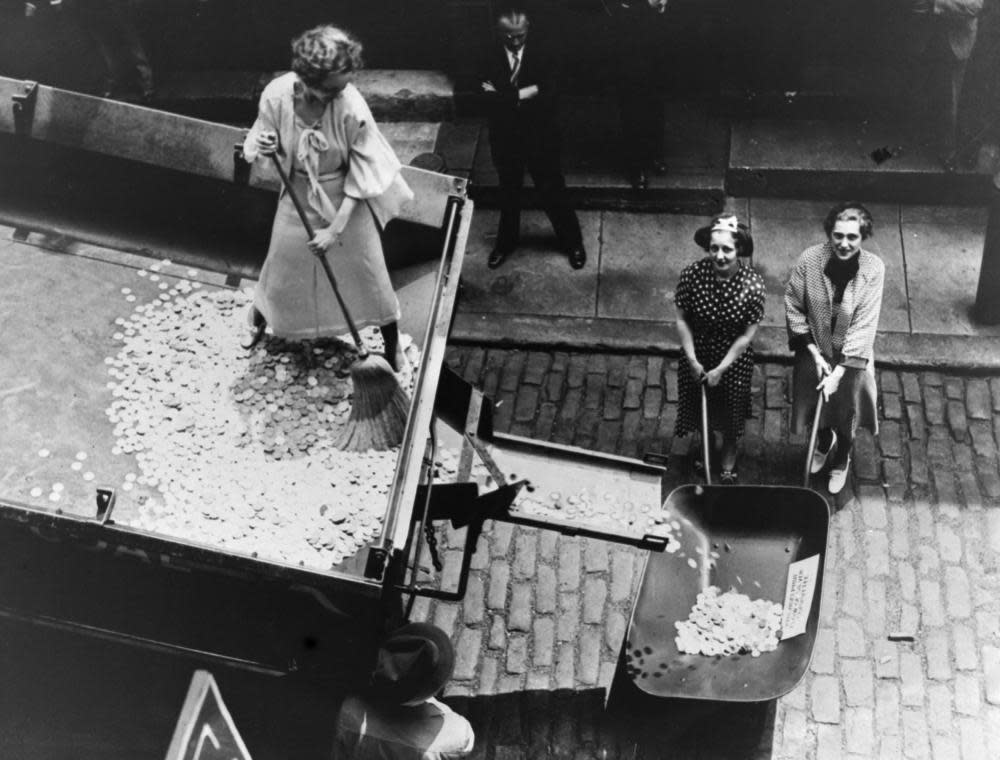I'm living a cash-only life in a tap-and-go world

Many years ago I rented the ballroom of a grand old Victorian mansion in a picturesque seaside town.
The ballroom had been converted into a flat. In the mansion above lived my landlord – a very rich man, who was said to be one of the inventors of Eftpos, the first electronic card payment system.
Eftpos may have been one of the greatest things ever invented, but it’s also been a gateway drug for other products, such as “tap-and-go” technology which has put a whole generation of people in debt because they were tapping for three coffees a day, in transactions that are too quick and easy to feel tangible.
Before ATMs and electronic payments, people had to walk into a bank to get money out. I remember my mother with her passbook, the teller entering amounts in a small column, his script neat, and the rush to get to the branch before it shut at 5pm.
The way we do currency has changed so much in a relatively short amount of time. Who uses cheques or even traveller’s cheques anymore? Who goes into a bank? Who carries cash? Only the very poor and stateless.
At a major food festival last year held in Sydney, it was card only. You couldn’t buy a four-pack of dumplings if you didn’t have paywave. Vendors claim that paywave streamlines service and makes the outlet less of a target for robberies or employee theft.
Now it’s expected, particularly in busy bars, restaurants and service stations, that you’ll tap and go. The arm holding the machine juts out before you even have the chance to pull out your wallet. China is leading the world in the cashless revolution – there are some millennials who haven’t been to the ATM in a year.
The other night a barman told me that most customers tap their cards when they buy drinks. “On weekends we used to get $180 cash in tips per worker,” he said. “It covered my rent. We don’t get tips anymore because no one carries cash.”
Twenty years ago I got a credit card for my first overseas trip and put big things on it – like a plane ticket. Lately I’ve been looking at my credit card statements and it’s all small tap-and-go stuff: coffees, lunches, top-ups for my travel card. All little sums, and they add up. Over the last couple of years I’ve rarely carried cash, but my spending has gone up.
Does the way we pay for things change the way we spend?
With tap and go, my credit card was hitting the ceiling with increasingly regularity (no matter, my bank would always generously offer to extend my limit). The technology – and laziness (who can be bothered pulling out the correct change?) – made it even easier to mindlessly spend.
Then three weeks ago I lost my ATM card and decided not to replace it (it would be my fourth lost or stolen card in a year). I decided to live a cash-only life in a tap-and-go world.
Now, once a week I race into a bank branch before it shuts at 4pm and get out a sum of money to last me all week. It’s annoying, but so is going into the weekend with no money.
So wherever I am on a Friday, there is a scramble to find a branch, and get there before 4pm. Then I have to queue up for my wad of cash that’s going to last me all week.
With an allocated amount of cash to spend each week, I find I’m spending less because I am not just mindlessly tapping my card every time I want to buy something.
A finite amount of cash in your wallet changes how you spend – it makes you less reckless and more deliberate. My friends throw their cards down at brunch, scarcely looking at the bill. I look and carefully count out my cash.
While I’m saving money by using a strict cash allocation as a budgeting tool, I’m finding that I am excluded from some things due to my cash-only lifestyle: flying on a budget airline last week (ticket bought before I lost my card), I wanted to increase my luggage limit – something I couldn’t do online without a credit or debit card. Instead I had to queue up (people who are cash-only find they spend a lot of time in queues) and I had to pay a premium with cash at the airport.
There are also fewer self-service grocery aisles or transport card top-up centres available for people without cards. In order to keep using ride-sharing services, Spotify and Netflix, I have set up direct debit via PayPal.
The move to a cashless economy is happening now without much questioning of whether or not it’s a good thing (it’s certainly good for banks).
But there is a subtle psychological benefit to using cash.
One of the problems of modern capital is its increased alienation from the fruits of labour. The modern knowledge worker that traffics in ideas or strategies doesn’t actually produce anything tangible to account for the hours at their desk. For many workers, it is only the numbers in the bank account that is proof of their labour.
Cash was only ever a token, but by handing it over the counter there was a clear trade: here is a percentage of my day’s labour in return for the labour you have undertaken to make, say, my sandwich.
That transaction has now been squeezed into a split second of time – the time it takes to “tap”. And in doing this, something is being devalued.
• Brigid Delaney is a Guardian Australia writer and columnist

 Yahoo News
Yahoo News 
